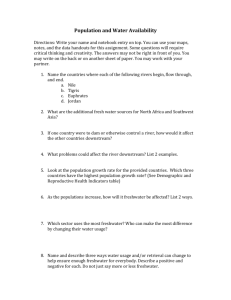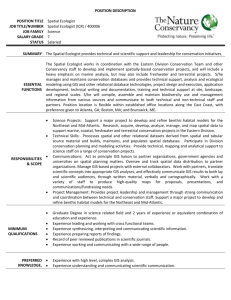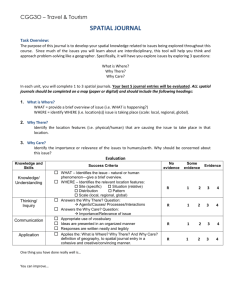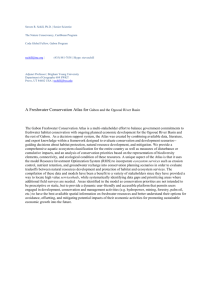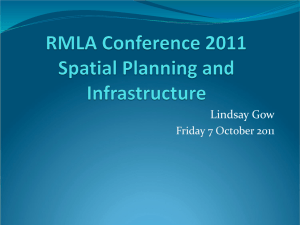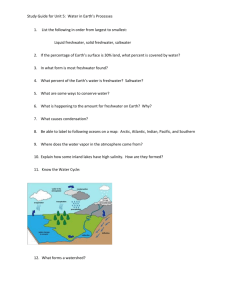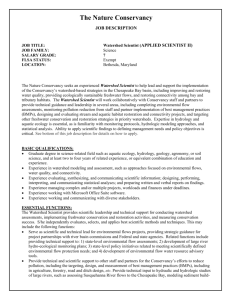Position Description Document (download)
advertisement
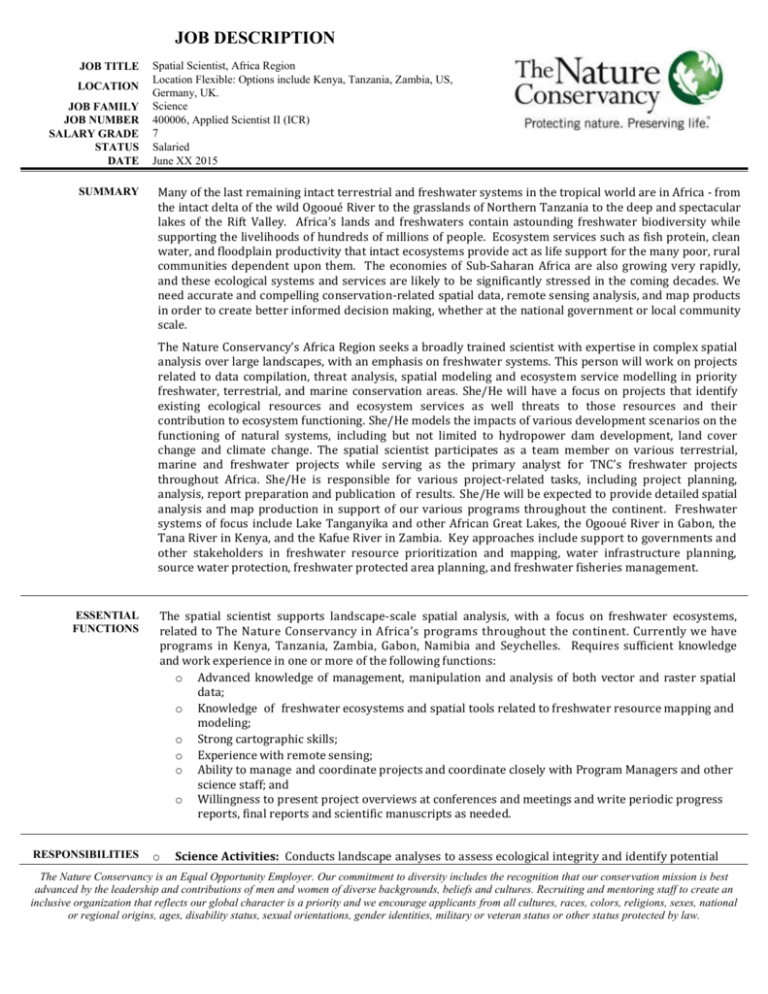
JOB DESCRIPTION JOB TITLE LOCATION JOB FAMILY JOB NUMBER SALARY GRADE STATUS DATE SUMMARY Spatial Scientist, Africa Region Location Flexible: Options include Kenya, Tanzania, Zambia, US, Germany, UK. Science 400006, Applied Scientist II (ICR) 7 Salaried June XX 2015 Many of the last remaining intact terrestrial and freshwater systems in the tropical world are in Africa - from the intact delta of the wild Ogooué River to the grasslands of Northern Tanzania to the deep and spectacular lakes of the Rift Valley. Africa’s lands and freshwaters contain astounding freshwater biodiversity while supporting the livelihoods of hundreds of millions of people. Ecosystem services such as fish protein, clean water, and floodplain productivity that intact ecosystems provide act as life support for the many poor, rural communities dependent upon them. The economies of Sub-Saharan Africa are also growing very rapidly, and these ecological systems and services are likely to be significantly stressed in the coming decades. We need accurate and compelling conservation-related spatial data, remote sensing analysis, and map products in order to create better informed decision making, whether at the national government or local community scale. The Nature Conservancy’s Africa Region seeks a broadly trained scientist with expertise in complex spatial analysis over large landscapes, with an emphasis on freshwater systems. This person will work on projects related to data compilation, threat analysis, spatial modeling and ecosystem service modelling in priority freshwater, terrestrial, and marine conservation areas. She/He will have a focus on projects that identify existing ecological resources and ecosystem services as well threats to those resources and their contribution to ecosystem functioning. She/He models the impacts of various development scenarios on the functioning of natural systems, including but not limited to hydropower dam development, land cover change and climate change. The spatial scientist participates as a team member on various terrestrial, marine and freshwater projects while serving as the primary analyst for TNC’s freshwater projects throughout Africa. She/He is responsible for various project-related tasks, including project planning, analysis, report preparation and publication of results. She/He will be expected to provide detailed spatial analysis and map production in support of our various programs throughout the continent. Freshwater systems of focus include Lake Tanganyika and other African Great Lakes, the Ogooué River in Gabon, the Tana River in Kenya, and the Kafue River in Zambia. Key approaches include support to governments and other stakeholders in freshwater resource prioritization and mapping, water infrastructure planning, source water protection, freshwater protected area planning, and freshwater fisheries management. ESSENTIAL FUNCTIONS RESPONSIBILITIES The spatial scientist supports landscape-scale spatial analysis, with a focus on freshwater ecosystems, related to The Nature Conservancy in Africa’s programs throughout the continent. Currently we have programs in Kenya, Tanzania, Zambia, Gabon, Namibia and Seychelles. Requires sufficient knowledge and work experience in one or more of the following functions: o Advanced knowledge of management, manipulation and analysis of both vector and raster spatial data; o Knowledge of freshwater ecosystems and spatial tools related to freshwater resource mapping and modeling; o Strong cartographic skills; o Experience with remote sensing; o Ability to manage and coordinate projects and coordinate closely with Program Managers and other science staff; and o Willingness to present project overviews at conferences and meetings and write periodic progress reports, final reports and scientific manuscripts as needed. o Science Activities: Conducts landscape analyses to assess ecological integrity and identify potential The Nature Conservancy is an Equal Opportunity Employer. Our commitment to diversity includes the recognition that our conservation mission is best advanced by the leadership and contributions of men and women of diverse backgrounds, beliefs and cultures. Recruiting and mentoring staff to create an inclusive organization that reflects our global character is a priority and we encourage applicants from all cultures, races, colors, religions, sexes, national or regional origins, ages, disability status, sexual orientations, gender identities, military or veteran status or other status protected by law. priority sites using standard spatial analysis and modeling tools. Develop predictive models of threats and/or species distributions. Participate in ecosystem service modeling and application of results. Integrate spatial data with field surveys to document ecological systems in project areas using standard methods and techniques. & SCOPE MINIMUM QUALIFICATIONS o Innovation: Participates in the ongoing development of new tools, methods, processes, and techniques that improve conservation action in The Nature Conservancy’s conservation priority areas and thematic opportunities. o Communications: Communicates the role of The Nature Conservancy in the conservation of biodiversity, and explain the utility of science-based conservation to partners. In collaboration with the Conservation Director and Africa TNC Program Managers, communicate regularly with key project partners and others to maintain strong partnerships and facilitate effective conservation. o Information Requests: Responds to requests for ecological information from partners and provide interpretation, as needed. o MS degree in Geographic Information Science, Ecology, Geography or related field and 4 years related experience, or equivalent combination of education and experience. Experience in designing, maintaining and analysis of spatial databases to meet organizational needs. Experience in developing and managing multiple projects. Experience in cartography and remote sensing o o o PREFERRED KNOWLEDGE, SKILLS & EXPERIENCE o o o o o o o o ORGANIZATIONAL COMPETENCIES Graduate degree in biological or information sciences with course work indicating knowledge of complex spatial analysis and/or statistical modeling, or comparable research experience. Experience with peer reviewed publication process. Demonstrated experience with landscape-scale spatial analysis and freshwater modeling. Knowledge of climate change impacts on ecosystems highly desirable. Project management and administrative experience, database management, word processing, and GIS skills. Ability to work effectively with others under pressure and tight deadlines. Capable of working independently to complete projects. Communicating clearly via written and spoken means in English. Basic communication skills in French desirable. Excellent graphical communication skills. Ability to write technical reports utilizing available resources. Ability to produce professional-quality map products. Willingness to travel throughout the project areas such as those in Kenya, Tanzania, Zambia and Gabon. Comfort articulating and advocating for The Nature Conservancy’s conservation mission. Communications Flexibility & Innovation Interpersonal Savvy Open to Learning Organizational Awareness Produces Results Effectively expresses messages verbally and in writing. Actively listens to others. Fosters open exchange of issues. Is timely with information. Flexible to changing circumstances. Takes innovative approaches towards work. Takes calculated risks and makes dependable decisions in the fact of uncertainty. Maintains positive working relationships. Contributes to productive partnerships inside and outside the organization. Understands team member roles and values the contributions of others. Effectively deals with conflict. Versatile learner and committed to self-improvement. Employs strengths effectively. Willingly shares knowledge with others. Seeks coaching on areas needing improvement. Adjusts behavior/performance as needed. Views mistakes as learning opportunities. Understands the basics of our business. Knows how local job relates to the big picture & contributes to the overall strategy. Knows how/why things work inside TNC. Easily moves through internal networks and channels for success. Takes Initiative. Focuses on priorities. Strives for excellence. Is dependable and accountable for results. Persistent in the face of obstacles and meets deadlines. The Nature Conservancy is an Equal Opportunity Employer. Our commitment to diversity includes the recognition that our conservation mission is best advanced by the leadership and contributions of men and women of diverse backgrounds, beliefs and cultures. Recruiting and mentoring staff to create an inclusive organization that reflects our global character is a priority and we encourage applicants from all cultures, races, colors, religions, sexes, national or regional origins, ages, disability status, sexual orientations, gender identities, military or veteran status or other status protected by law. HOW TO APPLY: To apply for this position, please submit a resume/CV and cover letter to Africa@tnc.org subject line: SPATIAL SCIENTIST, AFRICA PROGRAM. Applications must be submitted by Friday, June 26th, 2015 to be considered. This description is not designed to be a complete list of all duties and responsibilities required for this job. The Nature Conservancy is an Equal Opportunity Employer. Our commitment to diversity includes the recognition that our conservation mission is best advanced by the leadership and contributions of men and women of diverse backgrounds, beliefs and cultures. Recruiting and mentoring staff to create an inclusive organization that reflects our global character is a priority and we encourage applicants from all cultures, races, colors, religions, sexes, national or regional origins, ages, disability status, sexual orientations, gender identities, military or veteran status or other status protected by law.
